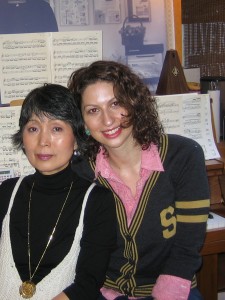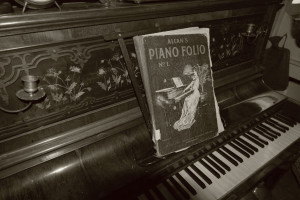In his early 30s, Matthew Harre felt disenchanted with his piano technique. So this graduate of composition from American University and a teacher of adult pianists enrolled himself in adult piano lessons. Over the course of his 14 years of study, Harre hammered together the foundation of the teaching practice for which he is revered today.
In what ways did your lessons impact your teaching style?
It’s the only reason I know what it feels like to take lessons as an adult. The going back to earlier pieces, the humiliation! It’s often crucial for adults to study easier pieces, so they can work on elements of instruction they might have missed at a younger age. This way they can work on those without being overwhelmed by note difficulties. But a lot of times adults don’t want to do that, and at first I didn’t either.
Tell us about your teacher, Alexander Lipsky, who was not only a prominent teacher but also a composer.
He lived in New York City, and every other weekend he took the train down to Washington DC and taught 30 to 40 students on a long weekend from Saturday through midday-Tuesday. Mrs. Lipsky was not terribly pleased with this arrangement, I fear. His students held him in high regard. They really admired him. He had enormous integrity.
How did you find out about Lipsky?
For years, I had heard that he was a very dictatorial teacher. He would make his students write his fingering in the music and follow that fingering, and he had a reputation for treating his students like marionettes.
I had a teaching colleague who studied with Lipsky. My friend could do things I couldn’t technically. But it wasn’t very musical. All of a sudden, my colleague started playing with much greater musical sensitivity.
I left my first lesson with Lipsky feeling more relaxed at the keyboard than I had ever felt at the piano in my life. You know, Lipsky was very warm. He said, if you’re a tense pianist you will choose fingering that maintains that level of tension. He focused on keeping the hand contracted, without overstretching. Think of it as watching an athlete who’s graceful. They’re obviously working very hard. But they’re not using one extra muscle.
Tell us more about what you learned.
Lipsky taught me that playing the piano has empirical aspects of physics. If you hit the piano key hard, you’re going to get a sharp spike in the sound, which will quickly drop, producing a harsh, unpleasant sound. But if you avoid that spike, you will avoid the initial percussive part, and then get a flatter sound that helps create the illusion of a fuller, richer, more legato series of tones.
He also had a set of exercises using arm motion. Getting the sense of the feeling of the heaviness of the arm and the shoulder is what produces a lovely tone. Think of how many people are always holding their shoulders up. It’s a form of tension. Well, that keeps the weight of the shoulders from getting into the keys and being part of the piano technique.
Really it was from Lipsky that I learned the technical approaches to playing the piano that are most important to me.




I took piano lessons from about age 10 to 13, minus about 14 months. I was at a late elementary to early intermediate level when I lost access to a piano at age 13. I resumed piano study at age 39! Thus, began the journey. I began playing in earnest and took a year of piano after about 4 years on my own. In 2004, I began lessons with an excellent teacher. In 2007, I went back to school and began work on a B.A. in Music. I graduated in December of 2010. I have also taken 3 courses in piano pedagogy. Now, I teach piano for music school.
Although I worked like crazy to get through my degree and college level piano lessons, my reading level lags frustratingly below where it should be. I find it very difficult to quickly process chords with many notes stacked. I also still have difficulty moving my fingers to the right piano keys as my eyes “stay on the page”. Chord analysis sometimes helps deciper the large chords, but not always. Feeling the keys to correctly land on the right ones is helpful, but sometimes that is too slow for many pieces.
I found that my university professor really didn’t know how to “custom fit” to the needs of an adult student with these note processing and kinesthetic issues. Yet, I was able to successfully learn and perform advanced piano literature with advanced musicianship. If I hadn’t, I am sure I would never have earned my degree. I began this degree at age 50!
I would like to hear about experiences teachers have had with 50 year old students, especially at the college level.
Thanks!
Mary, thank you for sharing your story. It’s very inspirational. I agree that the needs of adult students are different. I’ll keep in mind your request for addressing students that are 50 plus. The Musical Fossils website also has some great articles on the topic.
I am writing to Grand Piano Passion to let you know how important your web site has been in my life in the last 4 years. I took piano lessons as a child ending at about age 14. I decided to start again at age 55. My children were almost grown up and I didn’t have such a lot o do in the house. I saw an advertisment on the notice-board of my local library and by chance I found a fantastic music teacher. Although she is half my age, she is a great teacher. She anticipates, guides, corrects and always in such a way that allows me to go forward with confidence. I dip into Grand Piano Passion on a regular basis and I have learned so much from articles and related sites that I can bring to my own studies. Thanks you so much and good luck in 2015 with all your projects.
best wishes,
Deirdre Acton
Dierdre, I’m honored that you consult our site for help and read our articles. Your story is very inspiring that you went back to the piano at age 55. I’m wishing for you lots of success with your lessons in 2015!
I played the piano from age 8 to age 15 and reached grade 7 although I did not take the exam. About 4 months ago I bought a new piano and started to play again at the age of 69. I have a wonderful piano teacher aged 25 who makes absolutely no concession to my age. She has entered me for Grade 7 and insists I will pass it before my 70th birthday in July ! Then on to grade 8!!
So great that you are back to the piano! Your teacher’s encouragement sounds spot on….and wonderful. Good luck in passing Grade 7!
I, too, studied with Lipsky. I met him after attending a recital in the home of one of his students who arranged for me to audition with Alexander on his next trip to Washington DC. I played a Schubert Impromptu for the audition and before I was done, Lipsky interrupted me and said he had seen/heard enough to know that I had the finger flexibility required for accomplishing what he wanted in a student (I was 30 at the time, and he was afraid that a student of that advanced age might be too stiff to do Lipsky’s program.) Every two weeks on Saturday morning I went to his studio on Wisconsin Avenue in Georgetown. It was a joy to play on his magnificent Steinway kept perfectly tuned and voiced by a friend of his who at one time had the job of tuning the pianos at Carnegie Hall in NYC. Piano was an avocation for me since I had a full time job as a research physicist. I also was an organist and choir director and my improvement in technique and musicality under Lipsky helped immeasurably in my church performances each Sunday. Alexander was a warm, brilliant, demanding teacher. He had me memorize every piece I studied so I slowly built up quite an extensive repertoire over the years. I loved his stories. They gave me a glimpse into the musical and social world of prewar Europe and into the rarified atmosphere of the company of Vladimir Horowitz who was Lipsky’s upstairs neighbor in New York. They and their wives sat down to dinner frequently and Lipsky loved to relax after Dinner and listen Horowitz play his Steinway. Magical times.
Peter, thank you for sharing these wonderful experiences!
Hi Peter,
I’m a pianist and musical director for Broadway-type singers in NYC and was a student of Mr. Lipsky’s for about five years until his death. (Which was 35 years ago last week, by the way.) On behalf of a colleague whose older adult cousin wants to begin piano lessons, I was just today asking another Lipsky student if he knew of any other one of us teaching Lipsky’s technique and approach; he didn’t, and neither do I. Do you happen to know any teacher in the New York area who fits the bill? I’d appreciate any leads you may have. Thanks!